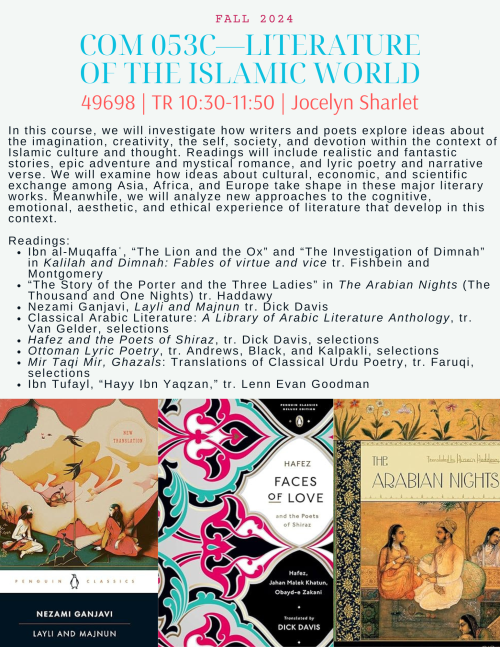Fall Quarter 2024
- For day, time, room, and TA information, see our PDF SCHEDULE or the class search tool https://registrar-apps.ucdavis.edu/courses/search/index.cfm.
- For all courses not described here, please refer to the General Catalog course descriptions: https://catalog.ucdavis.edu/courses-subject-code/com
Undergraduate Courses
Lower-Division
COM 001—Major Works of the Ancient World
COM 002—Major Works of the Medieval & Early Modern World
COM 003—Major Works of the Modern World
COM 004—Major Works of the Contemporary World
Section 001 - Mary Elliott
The Dialectic of Love: Emotion and Aesthetics in the Ancient World Though, arguably, the most productive human emotion, love has been alternately elevated and relegated in academic circles. As a source of inspiration, love is revered but, since the enlightenment, as a topic of philosophical inquiry, love has been reviled. In this course, we will look back at expressions of and conversations surrounding love in the ancient world to try to formulate a better understanding of the role that love has played in both artistic and intellectual spheres. Through the works of Plato, Sappho and Longinus, along with The Epic of Gilgamesh, Sophocles’ Antigone and other tales of love in myth and folklore from around the world, we will take into consideration the connection between emotion and aesthetic experience; between love (be it eros, philia, storge or agape), beauty and the sublime.
Section 002 - Jala Alarja
Section 003 - Danny Dyer
COM 005—Fairy Tales, Fables, and Parables
Nick Talbott
COM 007—Literature of Fantasy & The Supernatural
Timothy Parrish
COM 053C—Literature of the Islamic World
Jocelyn Sharlet
TR 10:30-11:50 TLC 3213
CRN 49698
In this course, we will investigate how writers and poets explore ideas about the imagination, creativity, the self, society, and devotion within the context of Islamic culture and thought. Readings will include realistic and fantastic stories, epic adventure and mystical romance, and lyric poetry and narrative verse. We will examine how ideas about cultural, economic, and scientific exchange among Asia, Africa, and Europe take shape in these major literary works. Meanwhile, we will analyze new approaches to the cognitive, emotional, aesthetic, and ethical experience of literature that develop in this context.
Readings:
Ibn al-Muqaffaʿ, “The Lion and the Ox” and “The Investigation of Dimnah” in Kalilah and Dimnah: Fables of virtue and vice tr. Fishbein and Montgomery
“The Story of the Porter and the Three Ladies” in The Arabian Nights (The Thousand and One Nights) tr. Haddawy
Nezami Ganjavi, Layli and Majnun tr. Dick Davis
Classical Arabic Literature: A Library of Arabic Literature Anthology, tr. Van Gelder, selections
Hafez and the Poets of Shiraz, tr. Dick Davis, selections
Ottoman Lyric Poetry, tr. Andrews, Black, and Kalpakli, selections
Mir Taqi Mir, Ghazals: Translations of Classical Urdu Poetry, tr. Faruqi, selections
Ibn Tufayl, “Hayy Ibn Yaqzan,” tr. Lenn Evan Goodman

Upper-Division
COM 112—Japanese Cinema
Michiko Suzuki
This class is an introduction to Japanese film from the early silent films to contemporary cinema. While exploring the history of Japanese film and its social and cultural contexts, we examine works by important directors (such as Kurosawa and Ozu), genres (such as avant-garde film and samurai film), themes and techniques. We will also read secondary critical materials on Japanese film and history. Particular areas of focus include gender, war, memory, censorship, visuality and narrative. Watching all films (through links on Canvas site) is mandatory. Lectures, readings and discussions will be in English. No previous knowledge of Japanese language or culture is required. GE: AH, WC, WE, VL
COM 166B—the Novel
Timoth Parirish
Graduate Courses
COM 210—Topics/Themes in Comparative Literature
Cheryl Ross
COM 255—Proseminar: Comparative Literature: Past, Present, Future
Stefan Hoesel-Uhlig
This course provides an introduction to the disciplinary parameters and opportunities of comparative literary studies. We will review the origins and famously self-critical construction of the field, and look at current arguments and new technologies that may define the future. Sessions on the history and theory of comparative literature will alternate with readings focused around basic media and literary forms (narrative, poetics, performance, photography and film). Along the way, we will discuss exemplary comparative scholarship on questions ranging from Greece and Rome, via the Latin middle ages, to the literatures of South Asia, India, China, and Japan. The goal will be to think about what makes some research questions – perhaps necessarily – comparative, and how to find the methods that will best address them. Participants will write an eight- to ten-page paper on how what they have read/discussed made them rethink their current dissertation plans.
COM 392—Teaching Internship
Cheryl Ross
